I have been asked on many occasions what we actually taught the students in the Environmental Art department at Glasgow School of Art. I usually replied, half in jest and tongue in cheek, ‘singing,’ and proceeded to quote a short three-line poem by Adrian Mitchell in which I’d changed only one word – ‘singing’ instead of ‘poetry’- but the meaning remains the same:
Letter to a politician.
I have read your manifesto with great interest
But it says nothing about singing.
This ‘singing thing’ is not unique. It has always been a part of university undergraduate life in one form or another. Yale University has a strong tradition. With Cole Porter as president of their Glee Club in 1913 how could it be otherwise. A recent tour by a huge alumni choir elicited; ‘Anyone who has sung in the Glee Club feels part of a family………We estimate that nearly half of all present-day undergraduates sing……I would say that Yale undergraduate culture is largely based on singing.’
Douglas Gordon’s comment that he was taught, ‘To sing. Not how to sing, but simply TO sing’ described a prevailing attitude in the department. Not everyone of course can, or feels inclined, to actually sing publicly in company, but I learned from my family upbringing, and in successive other situations, the value of a few drinks and a ‘sing-song’ in forging a close and friendly social setting. Where there is mutual and supporting respect for the efforts of the individual, a confidence is bred in which people do perform whether it be a song, a poem, a story, whatever takes their fancy. That for me is singing. As the poet Shelley said, ‘social enjoyment in one form or another is the alpha and omega of existence.’
One tradition of the department took place in the last week of the Christmas term when we visited The Drover’s Inn north of Loch Lomond. This event served a number of purposes. An end of term party is a universal activity, so nothing unusual about that. Going somewhere as a group too is not unusual. But this was in many ways so much more. Once or twice we went to Glencoe first. For many students who had joined the course from other parts of the UK and abroad this was their first experience of the Scottish Highlands. It was also the case that many Scottish students had also never been there. Glencoe is stunning and of course soaked in a bloody history. On the way there a stop at Rannoch Moor to absorb the ‘prehistoric’ landscape and the site of Josef Beuys’ performance of his ‘Kinloch Rannoch Symphony,’ added to the mystery of it all. We headed back south and around mid-afternoon arrived at The Drover’s. It was quiet at that time of day and at that time of year, so we virtually took over the whole bar. This we did with the nod of the owner who was happy to accommodate 40/50 students out to celebrate. As is the case with this kind of thing, it starts slowly and as the drink begins to take hold singing and dancing break out. Nothing unusual about that either, but for these kinds of events to become memorable it has in some ways to be orchestrated otherwise it just becomes any other drunken pub night. By inviting people to sing their favourite songs or recite a poem, all the time insisting on the attention of the rest, it works. The old adage of, ‘One singer, one song,’ actually does work. One has to lead it too so that when a gap appears and the whole thing seems to be going off the boil, one has to be able to step in and do the business oneself! Many well-known songs are sung and some are perennial favourites and some others lend themselves to harmonies so the group would be in full song. The piano, utterly out of tune but it did not matter, was played. The Landlord put on dance tunes and dancing would break out. I always insisted that the coach set off back to Glasgow at around 8-00. After five hours at the Drover’s people were not too drunk and the whole coach sang as it twisted its way down Loch Lomondside. On one occasion, having got everyone on the coach, I felt a desperate need to get a drink for the journey back. I had a plastic cup so went back to the bar to get it filled with whisky. I stood next to an elderly couple that I had noticed earlier sitting at the bar and said, apologetically, that I hoped that we hadn’t upset their quiet early evening drink. The reply stunned me. “Oh no…. not at all we loved it ….. we heard some of our favourite songs. We were here last year!”
The most evocative description I have read about this experience of singing and the notion of ‘one singer one song’ is that by Laurie Lee in his book, ‘I Can’t Stay Long – Voices of Ireland’.
‘What followed was typical of other bars I went to in Galway, Kerry and Cork – something halfway between a wake and a wedding, half celebration, half common grief. The fiddler began with some horse-fair reels, then the piper took his turn. Then one by one, as the finger pointed, each man in the bar sang a ballad; old men with the slurred incantations of bards, young men with hot fruity tenors, each singing, eyes closed, reaching back in his mind, songs which smelt of the very skin of Ireland.
This was not the boozy wail of the usual pub singsong but a haunting restatement of identity. The songs I heard that night were heard in silence, or with little murmurs of approval. And they were almost all of them cries of loss – lost love, a lost cause, the loss of Ireland itself, parting, departure, death. ……………. they had that bite of melancholy at the heart of all folk song, celebrating a beauty too brief to bear. The night was long and deep; everyone took his turn……………’
Like most other art schools that are not in London, an annual London trip is more or less ‘de rigeur.’ On one return trip in October, fuelled with a goodly amount of booze from an off-licence near Euston Station, half the group, determined smokers all, occupied a section of the only smoking compartment on the northbound Virgin train. In due course after an hour or so into the journey the first songs, jokes and stories began. Soon some of the other passengers were joining in until we had a thoroughgoing sing-song. From time to time the odd smoker, trapped in the ‘no- smoking’ section of the train, would appear in the compartment, have a smoke and then disappear back to their seats. Our gallus female students, and there were two in particular for whom the term gallus was surely invented, would set upon these nicotine freaks and demand a song. One or two obliged and got such a rousing applause for their efforts that they went back to get their luggage and joined us for the rest of the journey. By now others had gathered round us from among the smokers, sitting on armrests or standing in the aisle. No matter how good or poor the song and the singing, all efforts were met applause. One of the nicotine freaks in particular was lionised by our gallous girls. He was, one could surmise, a business-man, short in stature and balding but he knew some good Scots and Irish songs and sang them with a good voice. We shared our booze with him and by the time we reached Central Station in Glasgow he, like all of us, was the better or worse of a drinking bout. His son had come to meet him and was standing at the end of the platform no doubt expecting a rather tired, maybe a little testy, father. Not a bit of it. Arm in arm with our gallous girls he strode done the platform eager to introduce us to his bewildered son and share with him this memorable journey. I’m sure the son was embarrassed – didn’t really want to know and just wanted to get his tipsy dad into the car and get home. Not only had our gallous girls won over our bedazzled businessman they had insisted that he must join us on our next visit to the Drover’s. I thought ‘Yeah, that’ll be right.’ However, a week or so later I got a letter from him;
Dear David,
Phew! What a night! There was I tired, weary, fed-up…….. I came up the train for a quiet smoke and suddenly found myself thrust into and surrounded by a wonderful group of people intent on enjoying themselves and trying to pass some of that enjoyment on to others…………………… Anyway I must commend you for exposing your students to the great art of self-entertainment……in your leadership by example…let your group know that they were most impressive, nice friendly relaxed people….evidenced by the way in which they so easily welcomed strangers into their company…….etc etc
Thanks for the memory!
Yours etc
In December, as the time for the Drover’s trip came around, our gallous girls got in touch and asked him to join us. He was up for it and asked if he could bring his brother along too! Our friend ran an Estate Agent business in the western fringes of the city. This was ideal as our coach could pick him up en route. The office was a shopfront and I cannot imagine what the staff must have thought as a fifty-seater coach pulled up outside full of young art students. I went in. The all-female staff were obviously unimpressed at thought of their boss being taken away for a day of drinking by a bunch of artistic wasters. ‘Is…….around? I arranged to meet him here’, brought an unsympathetic and equivocal reply like, we heard of this and think he’s gone doolally! I went outside and soon a Mercedes saloon drew up and our friend and his brother got out. I was introduced to the driver, his wife. As we drove off, his staff crowded at the office windows shaking their heads. We had a great time at the Drover’s that day. Our guests sang a number of songs and seemed to have as good a time as the rest of us.
Coach and train travel to field trips, as I’ve described, provided the right ambience for singing. The coach is of course exclusive as only we are in it. The train on the other hand is shared with others and the most memorable singing event, reports of which even made the BBC Radio 4 Today Programme and The Times newspaper, happened on a train.
We knew this was going to be a special journey when I managed to get First Class return tickets to London at £29-00 each under a scheme called ‘Virgin Groupies.’ What I did not know was that meals, snacks and beverages were complimentary so much so that I brought food for the journey south. The tables were set for breakfast and I said I wouldn’t be having it as I had food of my own and certainly did not want to pay the outrageous price normally charged on trains. My colleague, Peter McCaughey, who, due to our very early start, probably hadn’t eaten anything since getting up and rushing to catch the train, scrutinised the menu being tempted by the prospect of a tasty, cooked breakfast. ‘It says here that it’s complimentary.’ I looked at it but doubted it so when the waitress appeared Peter enquired if breakfast was indeed free? She replied with some disdain that that is exactly what the word ‘complimentary’ meant! For our return trip we gathered at Euston Station in good time for our 5-30 departure. It was a Friday and the First Class compartments were crowded but we all had booked seats. All of us were easily distinguishable from the normal ‘suits’ in First Class and those passengers who arrived late and had not booked a seat began to complain to the train staff in terms like, ‘Who are these people? Surely they are in the wrong section of the train? Could you remove them? We paid for First Class travel and cannot get a seat!’ The train departed with threats in the air. We got to Milton Keynes in an hour but the train did not depart for some time. By now dinner was being served and the wine was going down a treat. So what…. delays often happen. After getting on the move again and, as the train struggled up to Rugby, word began to circulate that there had been an accident further up the line. Then it was confirmed; there had been a derailment at Stafford and the train would not move until the line was cleared or another route taken. The Virgin staff were fantastic for this was the signal to wheel out the drinks trolleys in an attempt to keep the customers happy. When I saw that the ‘suits’ were rapidly clearing the trolleys by taking handfuls of beers, gin and whisky miniatures with appropriate mixers I had no qualms myself in doing likewise. The students of course were well-used to making the most of such situations. The mood in the compartment became convivial and when I heard the first notes of a song coming from one of the ‘suits’ that was my signal. I joined in and soon a full-blown singsong was taking place. More drinks and snacks were provided. Solos were being sung with panache and groups were rendering their favourite rugby songs with great gusto. We were still outside Rugby station but it didn’t matter as we were all having a great time. It was at this point that Peter said, ‘You should see what’s going on in the next compartment….the students have got the passengers to make drawings of Richard Branson!’ I hurried along. The place looked like a primary school drawing class. The large paper dinner mats had been turned over and used for drawings which been taped on to the windows and hung from the luggage racks all around the compartment. True to the singing tradition, the passengers had also been encouraged to write the title of a song appropriate to our predicament. So next to images of Branson were, among many others; ‘Help,’ ‘Homeward Bound,’ ‘By the time I get to Phoenix,’ ‘Show me the way to go home.’ The last one was enough to get me started and the whole place was soon in song. At one point a silver-haired, elderly and distinguished looking man came up to me and said that this was one of the most enjoyable train journeys he had ever been on. He praised the students; couldn’t say enough about how wonderful they were. And then he said with astonishment in his voice, ‘Look, over there is a brain surgeon, that one there is the chief executive of a company, that one over there is a QC, and they are all singing. You must get on to the media about this. It’s just too good a story!’ In the haze and daze of it all I can’t remember exactly where we had got to at this point. Crewe maybe and the train was now running four or five hours late. At one station one of the ‘suits’ didn’t want to leave the train as he was having such a great time that his mates had to drag him off before it departed. The Virgin staff had by now given out all the drinks and food. However, I had a litre of Jameson’s stowed away in my bag ready for just such a situation. The Jameson’s was flourished like a conjuror taking a rabbit out of his hat and this kept us going for a bit more of the journey. We rolled into Glasgow Central at 3-45 am on the Saturday and, still high, marched into the Station Master’s office to pick up our refund claim forms for being five hours late. The cheek of it!
I got into the art school on the Monday morning to find the drawings pinned up in the studio and copies of an article in The Times with the headline ‘Delayed Virgin travellers adopt a party line!’ Some people had heard an interview on the Today programme with one of the ‘suits.’ I wonder if it was the silver-haired one? Some weeks later Virgin sent a cheque refunding the whole cost of our travel!
But since it falls unto my lot
That I should rise
And you should not
I’ll gently rise and softly call
Goodnight and joy be to you all”
From: The Parting Glass
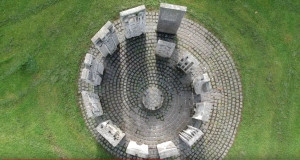 Introduction
Introduction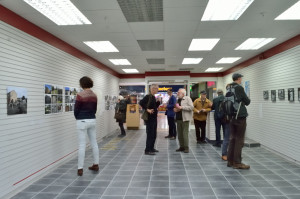
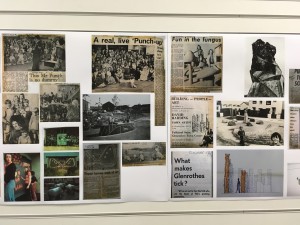
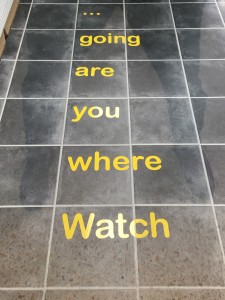
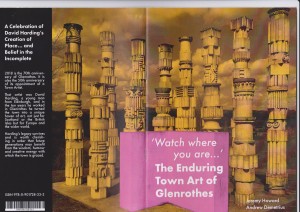
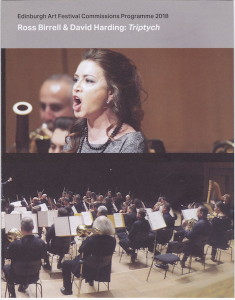
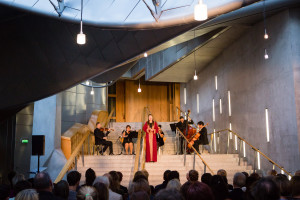
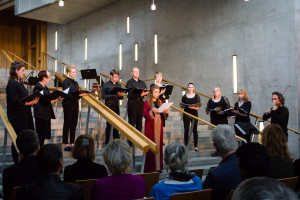
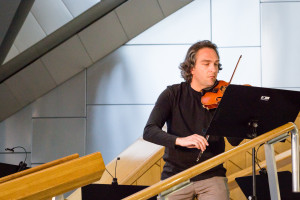




 It will immediately become apparent that ‘desire lines’ have been made by the movement of peoples from Syria and other parts into Europe and that, what is in short supply, is love. Beckett’s words, written in 1936 to a woman he had fallen in love with, are like a puzzle carrying a certain obscurity as if he could not quite come out and say, ‘I love you’. However he does set up a necessary reciprocation where love is concerned – that we are dependent on each other for love to flourish.
It will immediately become apparent that ‘desire lines’ have been made by the movement of peoples from Syria and other parts into Europe and that, what is in short supply, is love. Beckett’s words, written in 1936 to a woman he had fallen in love with, are like a puzzle carrying a certain obscurity as if he could not quite come out and say, ‘I love you’. However he does set up a necessary reciprocation where love is concerned – that we are dependent on each other for love to flourish.
 Symphony of Sorrowful
Symphony of Sorrowful 